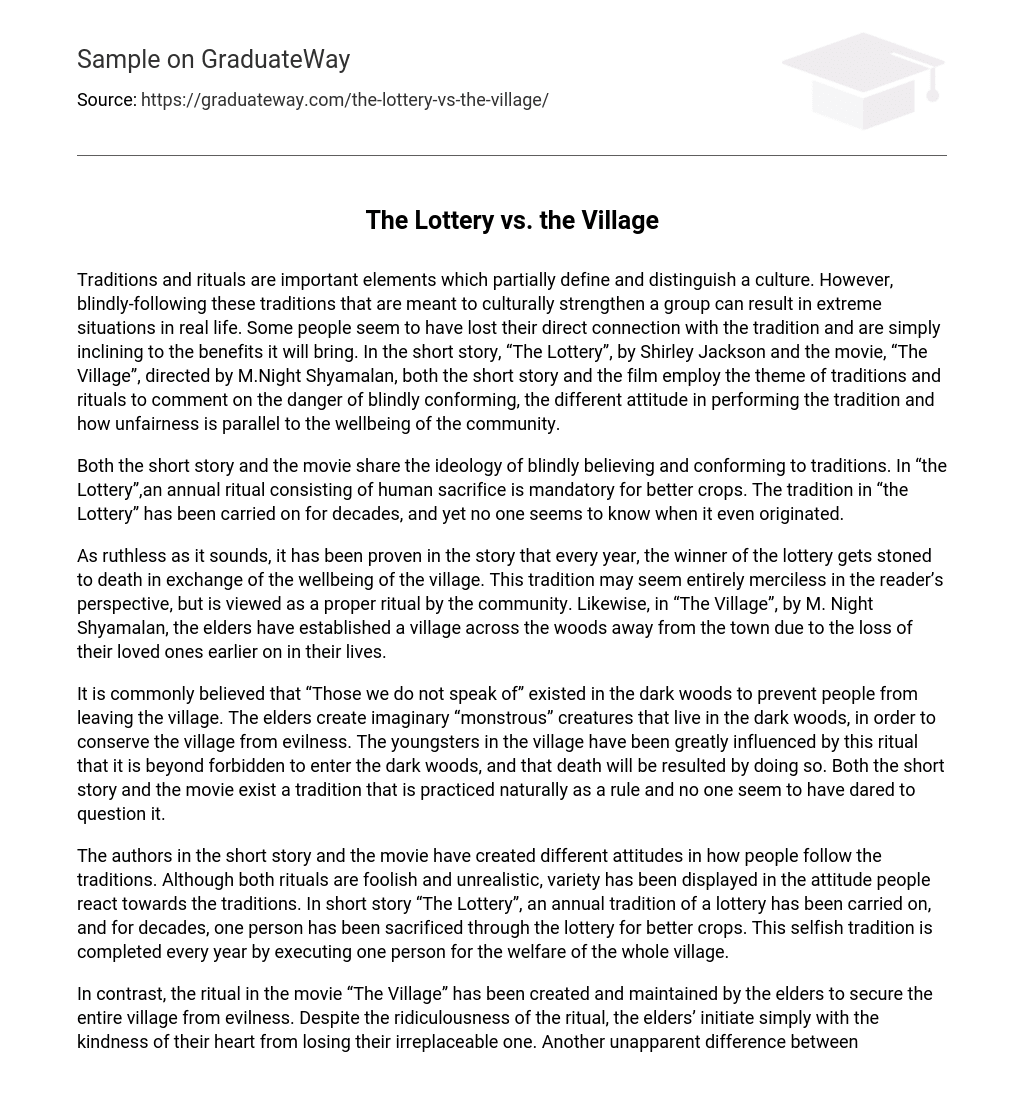Traditions and rituals are important elements which partially define and distinguish a culture. However, blindly-following these traditions that are meant to culturally strengthen a group can result in extreme situations in real life. Some people seem to have lost their direct connection with the tradition and are simply inclining to the benefits it will bring. In the short story, “The Lottery”, by Shirley Jackson and the movie, “The Village”, directed by M.Night Shyamalan, both the short story and the film employ the theme of traditions and rituals to comment on the danger of blindly conforming, the different attitude in performing the tradition and how unfairness is parallel to the wellbeing of the community.
Both the short story and the movie share the ideology of blindly believing and conforming to traditions. In “the Lottery”,an annual ritual consisting of human sacrifice is mandatory for better crops. The tradition in “the Lottery” has been carried on for decades, and yet no one seems to know when it even originated.
As ruthless as it sounds, it has been proven in the story that every year, the winner of the lottery gets stoned to death in exchange of the wellbeing of the village. This tradition may seem entirely merciless in the reader’s perspective, but is viewed as a proper ritual by the community. Likewise, in “The Village”, by M. Night Shyamalan, the elders have established a village across the woods away from the town due to the loss of their loved ones earlier on in their lives.
It is commonly believed that “Those we do not speak of” existed in the dark woods to prevent people from leaving the village. The elders create imaginary “monstrous” creatures that live in the dark woods, in order to conserve the village from evilness. The youngsters in the village have been greatly influenced by this ritual that it is beyond forbidden to enter the dark woods, and that death will be resulted by doing so. Both the short story and the movie exist a tradition that is practiced naturally as a rule and no one seem to have dared to question it.
The authors in the short story and the movie have created different attitudes in how people follow the traditions. Although both rituals are foolish and unrealistic, variety has been displayed in the attitude people react towards the traditions. In short story “The Lottery”, an annual tradition of a lottery has been carried on, and for decades, one person has been sacrificed through the lottery for better crops. This selfish tradition is completed every year by executing one person for the welfare of the whole village.
In contrast, the ritual in the movie “The Village” has been created and maintained by the elders to secure the entire village from evilness. Despite the ridiculousness of the ritual, the elders’ initiate simply with the kindness of their heart from losing their irreplaceable one. Another unapparent difference between the short story and the movie will be how unfairness is parallel to the wellbeing of the community. In “The Lottery”, Jackson has created the character of Tessie Hutchinson to represent the act of unfairness in the story.
Since no one in the village is excused from the lottery, they are indirectly implanted with the conviction that they have the right to murder a member of their community. No one is to protest against the outcome and is forced to simply accept it regardless of their positions. On the contrary, the unfairness in “The Village” is delivered through lies, how the elders created stories to brainwash the younger generation in order to keep them away from evilness.
This act is unapproved, but is done merely out of the elders’ strive for peace. Unnecessary killing or sacrificing of human are not practiced but the improper manner used to maintain peace. In conclusion, short story, “The Lottery”, by Shirley Jackson and movie, “The Village”, directed by M. Night Shyamalan, have shown similarities and differences in the way traditions and rituals are conveyed. In both stories, the authors attempt to bring out the worst of human behavior, leaving the story and the film comparable.





